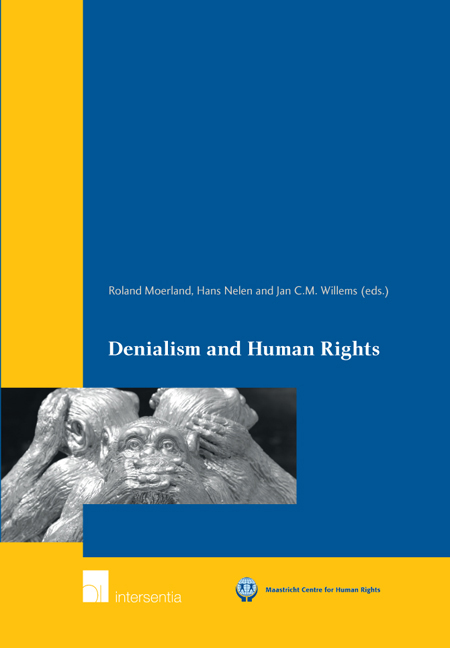Book contents
- Frontmatter
- Contents
- Acknowledgements
- Chapter I Introduction
- Chapter II Denialism and the Problem of Indifference
- Chapter III Denial and Acknowledgment in Public Responses to Information about Human Rights Violations
- PART I CHILDREN'S RIGHTS
- PART II GENOCIDE
- Chapter VIII The BBC Documentary ‘Rwanda's Untold Story’: Acknowledging Genocide or Denying It?
- Chapter IX Fighting NS Ideology and Holocaust Denial in Austria: Past and Present Perspectives
- Chapter X The Holocaust and its Denial: A Paradigm in our Historical Culture
- Chapter XI Can the Law Understand the Harm of Genocide Denial?
- Chapter XII On the Breaking of Consensus: The Perinçek Case, the Armenian Genocide and International Criminal Law
- PART III (INTER)NATIONAL ORGANISATIONS
- PART IV NEW PENOLOGY
- PART V SOCIAL, ECONOMIC AND CULTURAL RIGHTS
- About the Authors
- Maastricht Series in Human Rights
Chapter X - The Holocaust and its Denial: A Paradigm in our Historical Culture
from PART II - GENOCIDE
Published online by Cambridge University Press: 19 September 2018
- Frontmatter
- Contents
- Acknowledgements
- Chapter I Introduction
- Chapter II Denialism and the Problem of Indifference
- Chapter III Denial and Acknowledgment in Public Responses to Information about Human Rights Violations
- PART I CHILDREN'S RIGHTS
- PART II GENOCIDE
- Chapter VIII The BBC Documentary ‘Rwanda's Untold Story’: Acknowledging Genocide or Denying It?
- Chapter IX Fighting NS Ideology and Holocaust Denial in Austria: Past and Present Perspectives
- Chapter X The Holocaust and its Denial: A Paradigm in our Historical Culture
- Chapter XI Can the Law Understand the Harm of Genocide Denial?
- Chapter XII On the Breaking of Consensus: The Perinçek Case, the Armenian Genocide and International Criminal Law
- PART III (INTER)NATIONAL ORGANISATIONS
- PART IV NEW PENOLOGY
- PART V SOCIAL, ECONOMIC AND CULTURAL RIGHTS
- About the Authors
- Maastricht Series in Human Rights
Summary
The Holocaust not only represented a tragic historical episode in itself, but it rapidly started to serve as a central point of reference and comparison by which to judge the essence of other genocidal practices – committed either before or after the Jewish catastrophe. It delivered a standard measure for our understanding and awareness of other major crimes and wrongdoings, either in the past or in the present day. ‘Holocaust awareness’ therefore has become one of the cultural pillars upon which an official postwar European identity was constructed. What is true for its acknowledgement necessarily also applies to its denial. They are equally indicative for our moral standing. The Holocaust and the way we pronounce upon it serve as a template for other acts of mass violence, and so does Holocaust denial. This chapter will look into how a dominant discourse of the Holocaust affects our notion of other genocides. And why is it that Holocaust denialism touches such a raw nerve in our society? The final question will be to what extent Holocaust denial provides a draft of a wider phenomenon of denialism comprising other genocides.
HISTORY AND MEMORY
In his internationally acclaimed book Postwar. A History of Europe since 1945 Tony Judt once convincingly pointed at the importance of the Holocaust and its commemoration for present-day European citizens. He called to mind German poet Heinrich Heine (1797–1856), who at the start of 19th century concluded that conversion to Christianity provided Jews the only opportunity to gain access to the community of European nations. However, this specific role of baptism in Heine's day and age has been taken over by extermination after 1945. The extermination, or rather its universal acknowledgment, has become the admission ticket to the community of civilised European nations. Those who call into doubt or who do not fully acknowledge the genocide of the Jews in the Third Reich condemn themselves to the role of international pariah. Denying or belittling the Holocaust is equal to placing oneself beyond the pale of civilised public discourse. ‘Auschwitz’, in other words, has become the benchmark for post-war European identity.
- Type
- Chapter
- Information
- Denialism and Human Rights , pp. 199 - 214Publisher: IntersentiaPrint publication year: 2016

